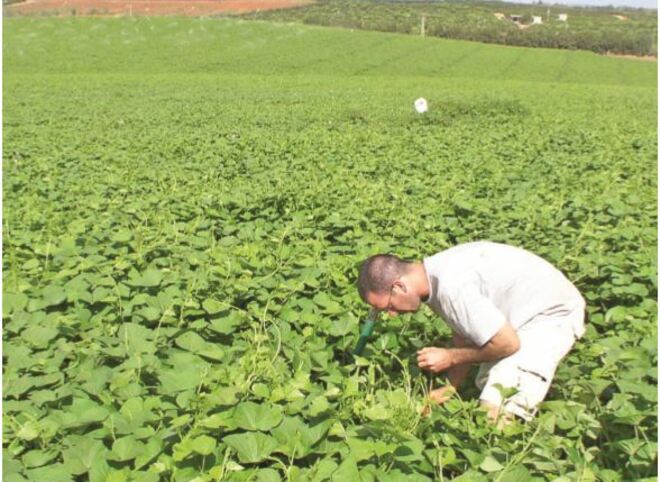Virus-resistant sweet potato planting material in offing
Farmers in Uganda may soon have access to virus-resistant sweet potato planting material once a research by a Ugandan agricultural scientist and Israeli researchers is concluded and rolled out.
By Geoffrey Kulubya in Israel
Farmers in Uganda may soon have access to virus-resistant sweet potato planting material once a research by a Ugandan agricultural scientist and Israeli researchers is concluded and rolled out.
The aim of the project is not to develop a new cultivar, but rather to understand the mechanism of virus resistance of the present East African sweet potato cultivars, to improve future breeding programmes.
Dr. Peter Wasswa of Makerere University's department of agriculture is undertaking the fouryear project with Dr. Victor Gaba and Dr. Amit Gal-On at Volcani Centre, an agricultural research centre in Israel.
The project, which is titled Sustaining sweet potato productivity by exploiting reversion from virus infection , is funded by the Bill and Melinda Gates Foundation and will run until 2018. The researchers are developing scientific tools for breeding advanced virus-resistant sweet potatoes.
Innovation In the long-run, this innovation is set to guarantee cheap and sustainable planting material, which is appropriate for subsistence farming systems. According to Wasswa, the project seeks to provide knowledge of the natural ability of some East African sweet potato varieties to resist virus infection and how to breed new virus-resistant sweet potato varieties.
This was revealed when a team of African journalists recently met Gaba at the Volcani Centre in Israel. The Volcani Centre serves as the research arm of Israel's Ministry of Agriculture and Rural Development.

The journalists were on a tour organised by the Israeli government to showcase Tel Aviv's achievements in tourism and agricultural technology in areas, such as irrigation and breeding of high-yield seeds, wastewater treatment and using wind and solar energy. The journalists also toured the Israeli Knesset (parliament).
Source of nutrition Gaba said the world should pay attention to sweet potatoes because they are an excellent source of human nutrition and calories. He said sweet potatoes are rich in vitamin A and that the foliage and crop waste make excellent animal feed.
The storage roots can be fermented or used as starch for food processing or baking. According to Gaba, subsistence farmers value sweet potatoes because few inputs are required for crop production. He said sweet potatoes can also withstand drought and other stresses. It can remain in the field (as a famine buffer) until required and serves as a cash crop.
However, the researcher argued that despite their importance in the world agriculture, sweet potatoes have not been studied enough, as it is a crop mainly found in the developing world, where research is still low compared to the developed world.
Widespread crop Meanwhile, Wasswa said sweet potatoes are likely the most important and widespread crop used by the rural poor as a daily food in Africa. However, availability of sufficient good-quality planting material is often the main constraint to production.
He said the quality of sweet potatoes is mainly compromised by viral diseases, which can reduce yields by up to 98%. Wasswa said most sweet potato plants infected with viruses show no signs of disease and cannot thus be singled out by farmers. One of the ways of ensuring good quality planting material, he said, is to use tissue culture.
However, tissue culture facilities focusing on production of sweet potatoes are few, especially in Sub-Saharan Africa. This makes the sweet potato plantlets expensive for small-holder farmers. Fortunately, Wasswa noted, some sweet potato cultivars in East Africa have been shown to revert from virus infections. Reversion in plants is the natural ability of previously virus-infected plants to ‘fight off' the virus and become virus-free.
Preliminary findings After three years of intensive research, Wasswa said the project had found that reversion from virus infections in sweet potatoes happens more frequently than previously thought.
For field plants, reversion varies between regions. This implies the influence of environmental factors on reversion. The team's preliminary findings, he explained, show that offspring can inherit reversion from their parents.
The reverting varieties could, therefore, be used in the breeding programme to improve the non-reverting farmer-preferred varieties. According to Gaba, their findings show that cultivated sweet potato can be infected by more than 40 different viruses of several different families.
These viruses are spread by insect vectors. He said the discovery of virus-resistant sweet potato plants in East Africa is a very important breakthrough.
Sweet potatoes in Israel In Israel, virus-free shoots produced through tissue culture are planted in September every year, multiplied by cuttings under protection until April. These are then planted in an open field and further multiplied, before being harvested in October.
However, due to intense vector pressure, the crop is often virus-infected at harvest time, but the yield is not affected. About 65,000 tonnes are grown on 1,300 hectares. Gaba said certain aspects of the virus resistance in sweet potatoes are similar to resistance mechanisms in cucumber.